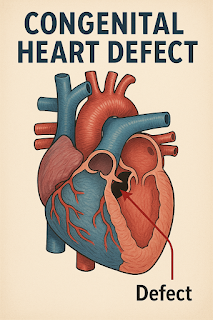Congenital heart defects (CHD), also known as congenital heart disease, are structural abnormalities in the heart or major blood vessels that are present at birth. These defects can interfere with normal blood flow and may vary from mild to life-threatening. Thanks to medical advances, many people born with CHD now live long and fulfilling lives—but early diagnosis and appropriate care remain critical.
Types of Congenital Heart Defects
-
Septal Defects
-
These involve holes in the walls (septum) between the heart’s chambers.
-
Common examples:
-
Atrial Septal Defect (ASD)
-
Ventricular Septal Defect (VSD)
-
-
-
Heart Valve Defects
-
These occur when heart valves don’t open or close properly.
-
Examples:
-
Aortic valve stenosis
-
Pulmonary stenosis
-
-
-
Defects in the Great Vessels
-
These affect the major arteries and veins connected to the heart.
-
Example:
-
Coarctation of the aorta
-
-
-
Other Complex Defects
-
These involve multiple structural problems.
-
Examples:
-
Tetralogy of Fallot
-
Transposition of the great arteries
-
-
The signs and symptoms of CHD depend on the specific defect and its severity. Some common symptoms in infants and children include:
-
Rapid heartbeat and breathing
-
Swelling in the legs, abdomen, or around the eyes
-
Extreme tiredness or fatigue
-
Cyanosis (a bluish tint to the skin or lips)
-
Difficulty breathing while feeding
-
Poor circulation
-
Heart murmurs
Diagnosing Congenital Heart Defects
Early detection is key to managing CHD effectively. Diagnostic tools include:
-
Echocardiography: A non-invasive ultrasound of the heart
-
MRI and CT scans: For detailed imaging
-
Genetic testing: To identify any inherited conditions
Treatment and Management Options
Treatment depends on the type and severity of the defect and may include:
-
Medications: To control symptoms and improve heart function
-
Surgery: To repair or replace damaged heart structures
-
Cardiac Catheterization: Minimally invasive repairs
-
Heart Transplant: For the most severe cases
-
Lifelong Care: Regular check-ups and follow-up care are often essential
Living with CHD: A Lifelong Journey
Medical advancements have transformed the outlook for those with congenital heart defects. Many children with CHD grow into adults who live active, healthy lives. However, continued care from pediatric and adult congenital cardiologists is crucial for long-term health.
Understanding congenital heart defects can help with early recognition and better outcomes. If you or someone you love is affected by CHD, know that with timely treatment and proper care, a full and meaningful life is possible. Always consult a cardiologist for diagnosis, treatment, and ongoing management.
For Enquiries: cardiologysupport@





No comments:
Post a Comment